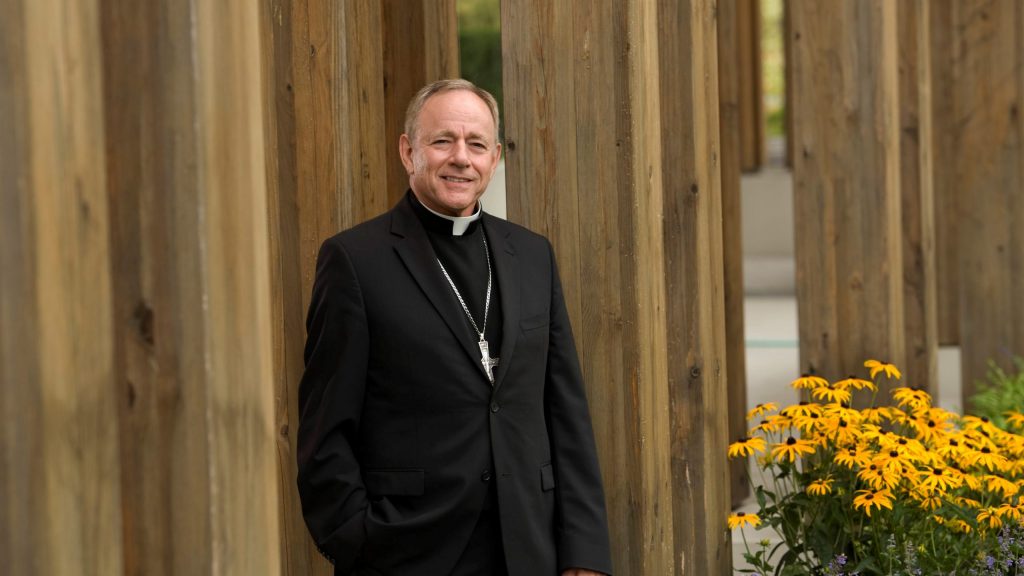Archbishop Michael Miller of Vancouver has announced that he is donating to the University of British Columbia’s research toward a COVID-19 vaccine.
“May the search for COVID-19 solutions also be a moment of solidarity, of collaboration, and of growing together as a visible sign to the world of the healing and reconciliation so needed right now,” Archbishop Miller said April 27 as reported by the B.C. Catholic.
Ryan Thomas, a special advisor to the archdiocese, told CNA that Archbishop Miller wanted to express, through his donation, the Catholic Church’s support for science and medicine that contribute to the common good.
“The Church— as Pope Francis has said from the beginning of his pontificate— is called to go out, we're called to engage, not called to retreat,” Thomas told CNA.
“From a scientific standpoint, that means identifying the research that is worthy of our investment, that meets the high standards that we have to protect life,” he said.
Thomas declined to specify the amount of the donation, but said that it was in the thousands of dollars.
The global effort to develop a COVID-19 vaccine includes at least 50 other research teams, the university says, many of which in the U.S. and Canada have received government funding and are being conducted by large pharmaceutical companies.
Pro-life leaders have warned in recent months that among the many COVID-19 vaccines currently in development worldwide, in some cases researchers are using old cell lines derived from the cells of aborted babies.
It was important to Archbishop Miller, Thomas said, that the Church be seen to be promoting research into a vaccine that Catholics can support in good conscience.
A group of Evangelical Christians and Catholics in Vancouver began to rally around the idea of supporting a vaccine that corresponded to Christian ethical standards, and eventually presented the idea of supporting UBC’s research to Archbishop Miller.
Thomas said Miller made sure to inquire about whether UBC’s vaccine research makes use of aborted fetal cells, which it does not.
Dr. Wilf Jefferies, the project’s lead researcher, told CNA via email that his research team is currently in the process of validating the potency of vaccine candidates in preclinical trials, in order to assess their potential toxicity before trying them in human subjects.
The UBC lab is using immune-boosting components called adjuvants in its vaccine candidate, with the hopes of reducing the dosage of vaccine required for complete protection against the disease. In addition, Jefferies hopes that UBC’s vaccine will continue to provide protection against COVID-19 even if the virus mutates over time.
“I am heartened by the unity and kindness that is being demonstrated during this pandemic,” Jefferies told CNA.
“I think the response by the archdiocese is an affirmative and practical way to address the critical need in our society to develop a vaccine...I am sincerely humbled by the support we have received from the archdiocese and from other groups and individuals.”
So far, Jefferies’ lab has received grants from the government-funded Michael Smith Health Research Foundation and the Sullivan Urology Foundation affiliated with the University of British Columbia, as well as a number of private donations.
There are at least 1,000 clinical trials currently taking place around the world to test potential COVID-19 vaccines.
A group of pro-life leaders in a letter to the Trump administration earlier this month reiterated that development of a COVID-19 vaccine should avoid unethical links to abortion.
“No American should be forced to choose between being vaccinated against this potentially deadly virus and violating his or her conscience,” reads the April 17 letter to Dr. Stephen M. Hahn, commissioner of the U.S. Food and Drug Administration.
“Fortunately, there is no need to use ethically problematic cell lines to produce a COVID vaccine, or any vaccine, as other cell lines or processes that do not involve cells from abortions are available and are regularly being used to produce other vaccines,” it continued.
The letter’s signers include Archbishop Joseph Naumann of Kansas City in Kansas, chair of the U.S. Conference of Catholic Bishops’ Committee on Pro-Life Activities; the heads of three other bishops’ conference committees; and leaders of many other Catholic and non-Catholic groups.
The Pontifical Academy for Life has noted that Catholics have an obligation to use ethically-sourced vaccines when available, and have an obligation to speak up and request the development of new cell lines that are not derived from aborted fetuses.
The 2008 Vatican document Dignitatis personae strongly criticized aborted fetal tissue research. However, as regards common vaccines, such as those for chicken pox and measles, mumps, and rubella (MMR), that may be derived from cell lines of aborted babies, the Vatican said they could be used by parents for “grave reasons” such as danger to their children’s health.
In a 2017 document on vaccines, the academy noted a “moral obligation to guarantee the vaccination coverage necessary for the safety of others… especially the safety of more vulnerable subjects such as pregnant women and those affected by immunodeficiency who cannot be vaccinated against these diseases.”

